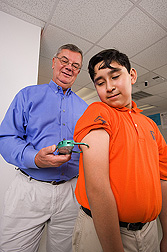This page has been archived and is being provided for reference purposes only. The page is no longer being updated, and therefore, links on the page may be invalid.
|
Read the magazine story to find out more. |
|
|
|
|
Kids Lose Pounds, Gain Fitness, in Houston Study
By Marcia Wood
March 1, 2010
Innovative, kid-friendly strategies for losing weight and gaining nutrition savvy—plus physical fitness skills—are emerging from scientific studies funded by the Agricultural Research Service (ARS).
For example, investigators Craig A. Johnston, John P. Foreyt and Chermaine Tyler and their colleagues are building upon one of their earlier studies in which many of their Texas middle-school participants achieved weight-management success. The volunteers were primarily Hispanic children who were either overweight or at risk of becoming so.
The researchers are with the ARS Children's Nutrition Research Center at Baylor College of Medicine in Houston, Texas, where Johnston and Tyler are instructors in nutrition and Foreyt is a professor of medicine.
Statistics that the scientists reported for the 6-month study were based on 57 overweight kids who wereassigned to either a self- and parent-taught program, or, instead, an intensive, instructor-led regimen.
For instance, once a week for the first 3 months of the investigation, kids in the self-taught group spent time in study hall reading a self-help weight-management textbook for youngsters. Meanwhile, their peers in the instructor-led team spent four class periods a week outdoors, improving their physical fitness, with a fifth session each week—indoors—learning about nutrition, healthy eating, and behavior-change skills essential for living an active lifestyle and making healthful food choices.
When evaluated at the end of the 6-month study, kids in the intensive, instructor-led course had significantly greater weight loss as well as greater "physical quality of life"—as measured by their answers to a standard questionnaire—than did the kids in the self-taught program. What's more, one and two years later, youngsters in the instructor-led team had significantly greater decreases in their body mass index, or BMI, than did the self-taught youngsters.
These preliminary results suggest that a school-based weight-management program might be effective in reaching large numbers of kids, according to the scientists. They published their findings in the journal Obesity in 2009 and in Pediatrics in 2007.
Read more about this research in the March 2010 Agricultural Research magazine special issue on preventing childhood obesity.
ARS is the chief intramural scientific research agency of the U.S. Department of Agriculture. The Houston research helps improve children's nutrition and health, a USDA top priority.

